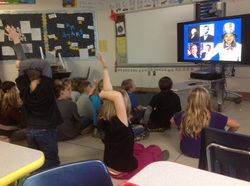 For many schools that are on a traditional nine month schedule, there are less than two weeks of school remaining for this year. Students AND teachers are excited about enjoying summer vacation. There is no question that teachers enjoy summer breaks as much as their students; however, it is a time frame in which they can brainstorm ideas for the next school year. Those ideas typically include reflecting upon the past school year and how they can tweak lessons/projects to make them more exciting and efficient. Technology is a major part of many classrooms at every grade level, and there are always great ideas regarding how to integrate technology into the classroom. Here are 5 ways to use Skype or Google Hangouts in your classroom: 1. Career Day The traditional Career Day involves a few adults from various occupational fields visiting a classroom, sharing what they do, and fielding questions from students. Often times it is challenging to find a time during the school day when the professional can visit. Skype and Google Hangouts makes it easier for the teacher and the guest. Travel time for the guest, which can be problematic in some cities, is eliminated. Teachers can easily make adjustments in their daily schedule to allow time for the virtual visit which is typically 30-45 minutes, or it could be two shorter time frames (e.g. 15 minutes each) within the school day (if that works best for the guest). It is also possible to take place on a weekend if the guest does not have time during the week. 2. Back to School Night I remember Back to School Night very well. It was one of the longest days of the year. Most teachers taught all day, stayed at school (turnaround time was to short to go home) for a couple of hours and then made a formal presentation (approximately one hour) to the parents. Each year there were a few parents that were unable to attend or parents that needed to divide time between different classes. Some schools have tried/are doing this already. How cool would it be for a school’s administration to let designate a Back to School Night Week and allow teachers to decide what night to give their presentation for the parents? This could contribute to greater participation especially for parents that may work late. Any parents that were unavailable, could watch a recording of the presentation. 3. Interviewing Experts Technology has made is extremely easy for people all over the world to communicate and be connected on a daily basis. Why not take advantage of it? Have students brainstorm 15-20 questions prior to the interview, and they can take turns asking them. Experts can include but are not limited to artists, musicians, scientists, firefighters, and paramedics. You can interview someone with a job that relates to what you are doing in class, or it can be something that the entire class is interested in. There are many possibilities to explore! 4. Allow students that are absent to catch-up or not miss class work Missing school due to sickness is a part of every student’s life. Using Skype or Google Hangouts will allow them to participate (watch class live as lessons are presented) or later view a recording when they are feeling better. 5. Parent-Teacher Conferences or updates on progress For a parent that travels often for work, is in the military, lives in a different city/state, or just happens to be unable to attend the conference on that particular day, Skype or Google Hangouts can be very useful in keeping them up to date and informed regarding their child’s progress. Sometimes it is good to have a face to face conversation (even if it is over the computer). 6. Connecting with classrooms in different states/countries Collaborating with other teachers/classes for specific projects and ideas can really create an excitement for learning within your classroom. Most teachers have friends that teach and/or they have connected with teachers via conferences, seminars, workshops, and Twitter. Be creative and find ways to enhance learning for your students using this tool. There are many more ways to use Skype and/or Google Hangouts in your classroom. Be creative, and have your students be a part of the process! You never know what great idea may result from their input. Do you use Skype or Google Hangouts in your classroom? If so, are you using it in a way that is not one of the 6 ways mentioned in this blog?
0 Comments
About this time each year, parents whose children attend schools with a traditional calendar experience a sudden rush of anxiety. Summer vacation is rapidly approaching (often times parents are unaware the school year is “ending so quickly”). Once it sinks in how quickly they will be thrust into more of a role of facilitator, they begin to repeatedly ask themselves, “What am I going to do with these kids when school ends?!” What seems to be a looming nightmare is actually not such a bad thing. However, it will take some planning and consistency to changes one’s thoughts from nightmare to smooth sailing. The following are some tips to make the 3 month summer vacation fun as well as educational (avoiding the ever present disease named "Brain Drain" which is most prevalent during the months of June, July and August).
1. Let your child know that just because school is closed for 3 months doesn’t mean learning cannot and/or should not take place. Inform them that learning takes place outside of the classroom as well. 2. Create a schedule of school work and leisure activities. It has become somewhat commonplace that students receive “Summer Packets” that contain work to be done periodically throughout the summer to keep their skills sharp. These summer packets generally contain Math, Language Arts and instructions regarding how much reading should be done. 3. Be sure to hold your child accountable for completing the school work on a weekly basis to avoid trying to finish three months of work during the week before the first day of school. Establish consequences for not completing the work as planned while creating the schedule. 4. Have your child spend 30 minutes reading at least 5 times per week. Have them keep a journal of everything they read. There is no need to write several pages for each entry but to stay in the habit of writing down one’s thoughts about what they have read (good or bad). 5. Take time to use “life” as a chance for your child to apply the mathematical skills and concepts They have learned in school. Remind them that “Math Is Everywhere”. • Calculating the cost of items at grocery/drug store, etc. (estimating) • Calculating the tip after a meal (percent) • Measuring for a simple home project (i.e. shelving paper) • Calculating area and perimeter using household items (i.e. find the perimeter of a picture frame) • Elapsed time (for trips via car, plane, or train) • Calculating price of a merchandise discount (percent) • Estimating how many gallons of gas can be purchased with $30.00 (estimating) 6. Have discussions about topics that may interest your child. Current events as well as events taking place in your community. Ask them questions that require critical thinking and a thoughtful responses. This will help them begin to answer questions intelligently. Good luck to you, and enjoy the summer!  Summertime...it denotes the end of the school year. One of the most desired times of year for students young and old;three months without classes, homework, projects, studying for tests, and tests. Definitely something to cheer about! Time to kick back and relax! However, an entire summer without any type of structure can pose problems for children with ADD/ADHD. For parents and caretakers, this is a good time to reflect upon/evaluate the behavior of your child/children during the school year and devise a plan of action to improve upon those expectations, habits, routines for the next school year. Here are four steps one can follow to help ensure the summer does not pass without maintaining the structure your child/children effectively built throughout the school year. 1. Maintain routine and structure
2. Effectively manage time
3. Positively reinforce good behavior
4. Explore new opportunities
|
AuthorRandy Sally Archives
June 2023
Categories
All
|


 RSS Feed
RSS Feed
